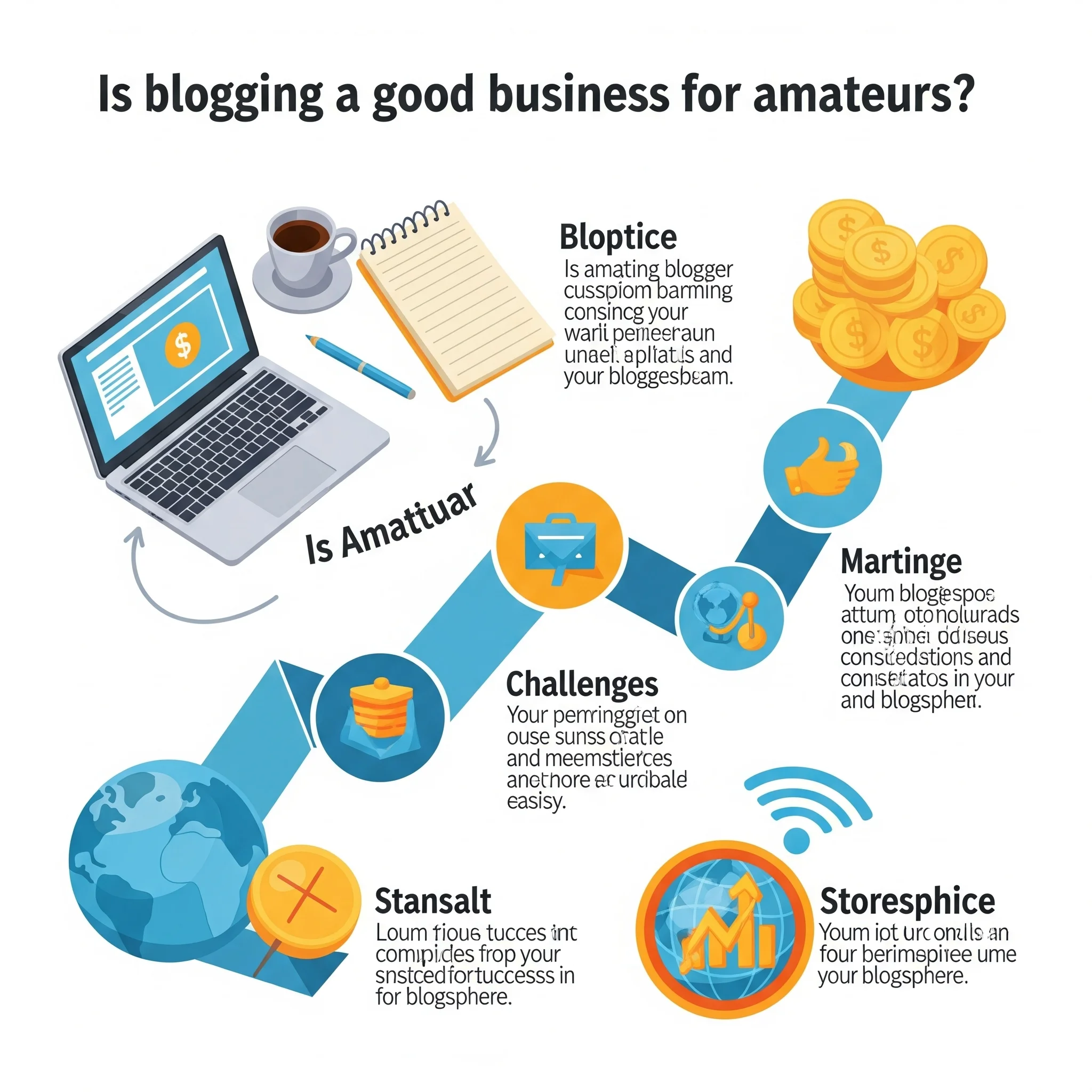Is Blogging a Good Business for Amateurs?

In an era driven by digital content and social connectivity, blogging has evolved from a personal journal into a lucrative online business. For many amateurs—people with no professional writing background or online business experience—blogging poses an exciting opportunity. But is blogging a good business for amateurs? The short answer is yes, but success depends on strategy, consistency, niche choice, and understanding how blog monetisation works.
In this guide, we’ll explore:
-
Whether blogging is profitable
-
What constitutes a blog business
-
How bloggers make money
-
How to start a blog from scratch
-
Which types of blogs are most profitable?
-
What beginners can realistically earn
Let’s dive in.
Is Blogging a Profitable Business?
The profitability of blogging has grown dramatically in the last decade. With low startup costs and the potential for passive income, blogging presents one of the most accessible business models for amateurs.
Why Blogging is Profitable
-
Low Overhead: Starting a blog costs little, mainly hosting, a domain, and perhaps a premium theme or plugins.
-
Scalable Income: Once your blog gains traffic, your income potential scales without increasing costs proportionally.
-
Multiple Income Streams: Bloggers can earn through ads, affiliate marketing, sponsored content, digital products, online courses, and more.
-
Global Audience: The internet removes geographic barriers, allowing bloggers to attract readers from anywhere.
Real-World Examples
-
Michelle Schroeder-Gardner of Making Sense of Cents earns over $100,000/month from affiliate marketing.
-
Pat Flynn of Smart Passive Income once shared monthly income reports showing earnings upwards of $150,000 from various sources.
-
Even smaller bloggers with under 50,000 visitors/month often earn $1,000–$5,000/month through a mix of income streams.
While the top earners may not reflect the average, they demonstrate the business potential.
What is a Blog Business?
A blog business is not just a website with articles—it's a strategic platform built to generate traffic, engage an audience, and convert visitors into income.
Components of a Blog Business
-
Content: The core asset of any blog. Quality, valuable, SEO-optimised content attracts and retains readers.
-
Traffic Generation: Blogging relies heavily on organic traffic (Google), social media, email marketing, and sometimes paid ads..
-
Monetisation : Turning traffic into money using methods like ads, affiliate programs, services, or selling digital products.
-
Audience Relationship: Building trust with your readers via email lists, comments, and engagement turns readers into loyal customers.
In essence, a blog business is a content marketing engine built for profit.
How Does a Blogger Get Paid?
Understanding blog monetisation is crucial. Bloggers don’t get paid by simply writing—they earn by monetising the attention and trust they build.
Main Ways Bloggers Make Money
-
Display Advertising: Programs like Google AdSense or Mediavine pay per click (CPC) or thousand views (CPM).
-
Affiliate Marketing: Promoting products and earning a commission on sales via unique tracking links.
-
Sponsored Posts: Brands pay for product reviews or mentions if you have a niche audience.
-
Digital Products: E-books, printables, templates, or courses are high-margin income sources.
-
Consulting or Services: Offering freelance writing, design, SEO, or coaching based on your niche.
-
Subscription/Membership Models: Premium content, communities, or courses behind a paywall.
Payment Frequency
-
Affiliate programs often pay monthly after a threshold is reached.
-
Ad networks usually have 30–60 day payment cycles.
-
Digital product income is instant if sold via platforms like Gumroad or self-hosted stores.
How Do I Start Blogging?
Starting a blog doesn’t require technical expertise or large investments. With the right steps, even amateurs can launch within a day.
Step-by-Step Guide to Start Blogging
-
Choose Your NicheFocus on a topic you enjoy, that solves problems, and has monetisation potential. Examples include personal finance, parenting, fitness, or tech.
-
Pick a Domain Name and HostingUse platforms like Bluehost, SiteGround, or Hostinger. WordPress.org is the preferred CMS for most bloggers due to its flexibility.
-
Install WordPress and Essential PluginsInstall themes and plugins for SEO (like Rank Math), speed (like WP Rocket), and security.
-
Create Core PagesAbout, Contact, Privacy Policy, and a homepage that tells readers what your blog is about.
-
Start PublishingCreate SEO-optimised content. Aim for at least 10–15 pillar blog posts before launching.
-
Promote Your BlogShare content on social media, join niche communities, and start building an email list.
-
MonetizeApply for affiliate programs or ad networks once traffic grows, and test digital product ideas.
What Type of Blog is Most Profitable?
Not all blogs are created equal. Profitability often depends on niche competitiveness, audience spending power, and advertiser demand.
Most Profitable Blog Niches
-
Personal Finance & InvestingHigh-paying affiliate programs and ad rates make this a goldmine. Examples: budgeting, credit repair, crypto.
-
Health & WellnessCovers fitness, weight loss, mental health, supplements—massive audience interest and affiliate potential.
-
Lifestyle & ProductivityVersatile niche with strong appeal for sponsorships, affiliate sales, and course creation.
-
Tech & GadgetsHigh affiliate commissions on electronics, software, or SaaS products.
-
Education & Online LearningEspecially profitable through course sales and affiliate promotions.
-
TravelOften monetised through affiliate links for booking, gear, and travel guides, although more seasonal.
Choosing the Right Niche
Ask:
-
Is there a demand for this topic?
-
Are people spending money on this niche?
-
Can I write 100+ articles on this subject?
-
Are there affiliate programs available?
How Much Can I Earn from Blogging as a Beginner?
This is the million-dollar question—literally. Beginner income depends heavily on effort, niche, content quality, and promotion.
Average Beginner Blogging Earnings
-
0–6 Months: $0–$100/month. Focus is on content creation and learning SEO
-
6–12 Months: $100–$1,000/month. With consistent content and smart monetisation, affiliate income or ads may begin.
-
1–2 Years: $1,000–$5,000/month. Blogs with 50k–100k monthly visitors often hit this range.
-
2+ Years: $5,000–$20,000+/month. At this stage, successful blogs become full-time businesses.
Key Factors That Affect Income
-
Traffic Source: SEO traffic generally converts better than social media.
-
Email List: A high-converting list can be more valuable than web traffic.
-
Monetisation Strategy: Bloggers who rely solely on ads earn less than those selling products or using affiliate marketing.
-
Content Volume: The more helpful, keyword-optimised content you produce, the faster you grow.
Common Pitfalls to Avoid
-
Expecting overnight results
-
Neglecting SEO
-
Choosing a niche with no income potential
-
Publishing low-quality content
Final Verdict: Is Blogging a Good Business for Amateurs?
Yes. Blogging is one of the best online businesses for amateurs. It's affordable, flexible, and scalable. You don’t need prior experience—just a willingness to learn and create value.
By starting small, staying consistent, and gradually learning the ropes of SEO, content marketing, and monetisation, amateurs can transform a humble blog into a thriving business.
Whether your goal is to build a side hustle or launch a full-time digital career, blogging offers a powerful platform for creative expression and long-term income.
Action Plan for Aspiring Amateur Bloggers
-
Pick a Profitable Niche
-
Start with WordPress and a Reliable Host
-
Publish 2–3 Posts Weekly
-
Learn SEO Basics
-
Join Affiliate Programs Early
-
Track Progress and Pivot as Needed
-
Be Patient and Stay Consistent


Comments